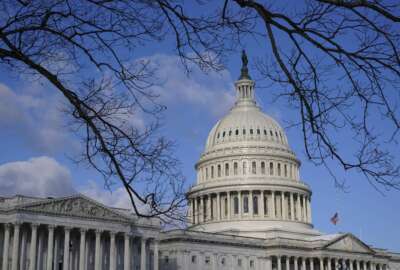Pay Cuts & Security Clearances
Getting and keeping a security clearance is vital in a growing number of federal jobs. And useful when feds retire and go into the private sector. But are those...
Security clearances, for obvious reasons, have always been important in government. Now with the war on drugs and the war on terrorism, having trustworthy, happy people is more important, in more jobs, than ever before. Having a security clearance (along with government-backed health insurance for life) is very useful when feds leave government, or retire, for a related job in the private sector.
Private contractors love getting experienced feds with their talent, experience, connections and security track records. But are budget-cutters about to make things worse?
Are the must-have clearances going to be harder to get, and keep, in the future?
Some feds think actions taken by the White House and planned by Congress will make it tougher for feds walking a financial tightrope to get, or keep, a clearance. Consider:
Federal pay has been frozen for two years. Congress (which is fast-becoming a millionaires-only club) may extend that freeze. There is talk of eliminating within grade raises, etc. There are also plans (outlined here yesterday) to increase the retirement contribution of FERS employees.
If, and it’s a big IF, FERS contributions are increased it would reduce take-home pay. Take home is your real salary, that is money you touch, smell and spend. For some people, especially in the higher grades, that is chump change. For many, however, take-home pay at current levels is highly useful for things like eating, rent/mortgage and paying the electric bill, etc.
Taking a 5 percent cut, during a pay freeze, could sink some employees. Example:
- ” It would be so unfair to force FERS employees to contribute more to their retirement. Does Congress know, or care, that the FERS benefit is about half that available to employees under the CSRS system? Does Congress know or care that FERS employees also pay the full amount into Social Security? Ninety percent of the people in my IRS office are under FERS. It has taken years to bring them up to optimal speed. Is Congress trying to drive them out of government?” – Ranger Rick
- “I’ve enjoyed your coverage of possible changes to federal workers compensation. I’d like to suggest a story idea: How might these potential reductions in take-home pay (due to increased FERS contributions, increased health insurance premiums, etc.) affect feds’ abilities to hold security clearances? We all know that credit ratings come into play, and anecdotally there are many feds living paycheck-to-paycheck. I think you see where I’m going with this.” – Chris
- A D.C.-based Justice Department employee said “Some of our agencies watching the Mexican border are having major problems because drug dealers are making a major effort to bribe U.S. employees either to look the other way, provide inside information, or for tips. Imagine what will happen if the pay freeze is extended and if they are forced to pay higher health premiums with a frozen and reduced paycheck?” – Tex-Mex Territory
- “Places like the DEA, CIA and Homeland Security are very sensitive to the money-problems of employees. At the IRS people get fired for even tiny tax problems. Cutting pay at this stage of the game is a form of fiscal madness. Don’t the clowns on the Hill know what is going on in the real world?” – Art
So what changes are Congress and the White House looking at? We’ll ask the experts. Today at 10 a.m. on our Your Turn radio show Dan Adcock, legislative director of the National Active and Retired Federal Employees talks about plans to reduce future cost of living adjustments for retirees by as much as $1,500 per year. Steve Losey, senior writer and Steve Watkins, editor at the Federal Times, will talk about other benefits that may be on the chopping block and the status of hiring reform efforts.
Listen if you can (1500 AM or online), and if you have questions call in or e-mail me at mcausey@federalnewsradio.com
NEARLY USELESS FACTOID
It’s not just vegetables, a different kind of crop is also dependent on rainfall; the Bryce Canyon Tiger Salamander population is based entirely on rainfall. The National Park Service says the salamanders are prompted to mate by rain showers which bring them out of their usual cave habitat and breeding takes place in pools and ponds.
MORE FROM FEDERAL NEWS RADIO
Senators fight DoD hiring freeze
The Defense Department is looking at a hiring freeze, but some senators say DoD may be breaking laws that protect employees against such head counts.
TSP automatic enrollment explained
Since the middle of last year, new federal employees, by default, gain access to the government’s retirement plan.
Survey: Cost of cloud may be top priority over security
Increasingly, IT security professionals are considering the costs and benefits associated with the transition to cloud computing, according to a survey.
Copyright © 2025 Federal News Network. All rights reserved. This website is not intended for users located within the European Economic Area.





